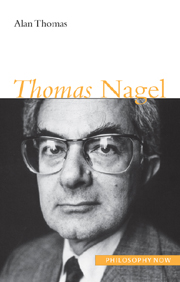Book contents
- Frontmatter
- Contents
- Preface
- Abbreviations
- 1 Subjective and objective
- 2 Understanding, knowledge and reason
- 3 Placing the mind in the physical world
- 4 The possibility of altruism
- 5 Practical objectivity, freedom and a realistic autonomy
- 6 Normative ethics: Nagel's hybrid ethical theory
- 7 Justice, equality and partiality
- Conclusion
- Notes
- Bibliography
- Index
5 - Practical objectivity, freedom and a realistic autonomy
- Frontmatter
- Contents
- Preface
- Abbreviations
- 1 Subjective and objective
- 2 Understanding, knowledge and reason
- 3 Placing the mind in the physical world
- 4 The possibility of altruism
- 5 Practical objectivity, freedom and a realistic autonomy
- 6 Normative ethics: Nagel's hybrid ethical theory
- 7 Justice, equality and partiality
- Conclusion
- Notes
- Bibliography
- Index
Summary
The preface of The Possibility of Altruism showed that Nagel was already beginning to revise and develop his view on the nature of reasons and ethics more generally. Further publications in ethics followed, but the next systematic presentation of his views on practical philosophy as a whole was a very influential discussion in The View from Nowhere. It is a wide-ranging account, focused on the idea of bringing the constraint of objectivity to bear on practice. It ranges from issues about freedom and autonomy, the subject of this chapter, to normative ethics, the subject of the next. Ethical impartialism remains the dominant approach to contemporary normative ethics, and in Nagel's work it receives a sophisticated statement and defence. I shall begin, however, with a more abstract consideration of how objectivity applies to practice via Nagel's discussion of the traditional problem of free will as that is how Nagel chooses to preface his own discussion in The View from Nowhere. Nagel structures his account very much as a reaction against the work of Peter Strawson, notably Strawson's well-known essay “Freedom and Resentment” (1974b). Some of the themes from Chapter 2, where I discussed Nagel's reaction against the context of Oxford philosophy of the 1960s, will be echoed in this chapter, for the issues of scepticism and responsibility are central to Nagel's analysis of the problem of free will.
- Type
- Chapter
- Information
- Thomas Nagel , pp. 137 - 162Publisher: Acumen PublishingPrint publication year: 2008



